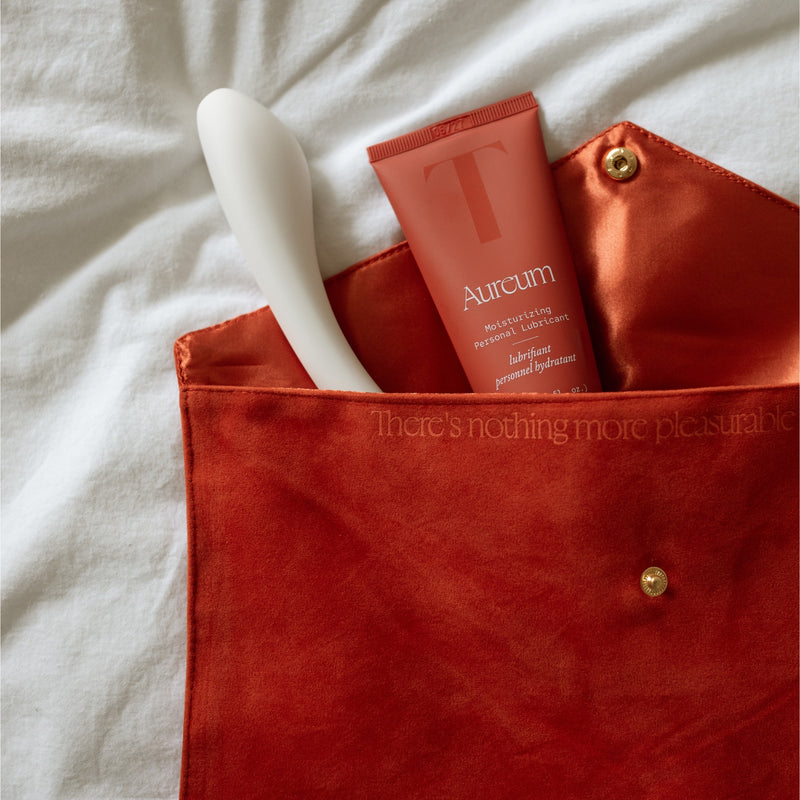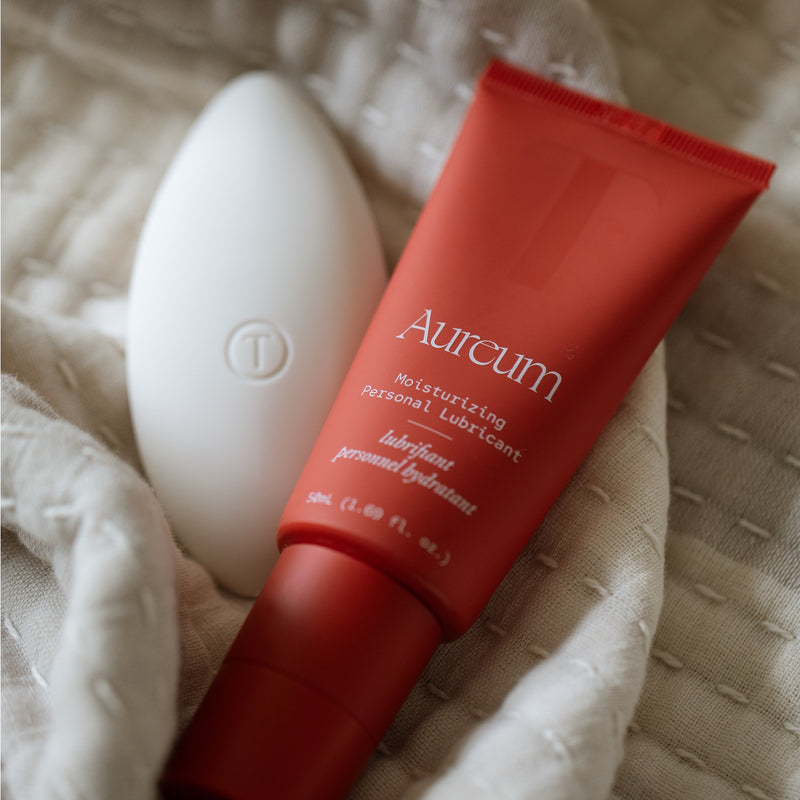
SHOP NOW
The 7 Surprising Preventative Care Benefits of Sex
Sexual activity is overwhelmingly associated with pleasure and intimacy, but its benefits extend far beyond the bedroom. Research has shown that regular sexual activity can have significant preventative care benefits, reducing the risk of various health conditions and promoting overall well-being.
From protecting the heart to reducing the risk of certain cancers and pregnancy complications, these preventative care benefits are both surprising and profound. According to Dr. Irwin Goldstein, Director of Sexual Medicine at Alvarado Hospital in San Diego, “people who are sexually active live longer.”

Reduces Risk of Catching Colds and the Flu
Engaging in sexual activity has been shown to boost the immune system, providing a natural defense against infections such as colds and the flu. Sexual activity stimulates the production of antibodies, which play a crucial role in fighting off pathogens and strengthening the body's immune response.
1
2
Reduces Risk of Heart Disease
Engaging in regular sexual activity has been linked to a lower risk of heart disease. Sexual activity is a form of moderate exercise, which helps to improve cardiovascular health by increasing heart rate, improving blood circulation, and lowering blood pressure. Additionally, the release of endorphins and other feel-good hormones during sex can reduce stress and promote relaxation, further benefiting heart health.
2
Reduces Risk of Heart Disease
Engaging in regular sexual activity has been linked to a lower risk of heart disease. Sexual activity is a form of moderate exercise, which helps to improve cardiovascular health by increasing heart rate, improving blood circulation, and lowering blood pressure. Additionally, the release of endorphins and other feel-good hormones during sex can reduce stress and promote relaxation, further benefiting heart health.
Reduces Risk of Breast Cancer
For women, regular sexual activity has been linked to a lower risk of breast cancer. Studies show that women who report more frequent sexual activity have a lower risk of developing breast cancer compared to those who are less sexually active. It is believed that the release of hormones such as oxytocin and endorphins during sexual activity may have protective effects against breast cancer development.
3
3
Reduces Risk of Breast Cancer
For women, regular sexual activity has been linked to a lower risk of breast cancer. Studies show that women who report more frequent sexual activity have a lower risk of developing breast cancer compared to those who are less sexually active. It is believed that the release of hormones such as oxytocin and endorphins during sexual activity may have protective effects against breast cancer development.
4
Reduces Risk of Prostate Cancer
For men, regular ejaculation through sexual activity or masturbation has been associated with a reduced risk of prostate cancer. Ejaculation helps to flush out potentially harmful substances and toxins from the prostate gland, lowering the risk of inflammation and cell damage that can lead to cancerous growth. Men who ejaculate more frequently may have a lower risk of developing prostate cancer later in life.
4
Reduces Risk of Prostate Cancer
For men, regular ejaculation through sexual activity or masturbation has been associated with a reduced risk of prostate cancer. Ejaculation helps to flush out potentially harmful substances and toxins from the prostate gland, lowering the risk of inflammation and cell damage that can lead to cancerous growth. Men who ejaculate more frequently may have a lower risk of developing prostate cancer later in life.
Reduces Risk of Atrophy
Sexual activity can help prevent vaginal atrophy, a common condition that occurs due to decreased estrogen levels, particularly during menopause. Both intercourse and masturbation help to maintain vaginal elasticity and lubrication by promoting blood flow to the vaginal tissues. This can help prevent symptoms such as dryness, pain during intercourse, and urinary symptoms associated with vaginal atrophy.
5
6
Reduces Risk of Atrophy
Sexual activity can help prevent vaginal atrophy, a common condition that occurs due to decreased estrogen levels, particularly during menopause. Both intercourse and masturbation help to maintain vaginal elasticity and lubrication by promoting blood flow to the vaginal tissues. This can help prevent symptoms such as dryness, pain during intercourse, and urinary symptoms associated with vaginal atrophy.
5
6
Reduces Risk of Preeclampsia
Preeclampsia is a serious pregnancy complication characterized by high blood pressure and protein in the urine. Research suggests that regular sexual activity during pregnancy may reduce the risk of developing preeclampsia. Sexual intercourse stimulates the release of oxytocin and prostaglandins, which help to relax blood vessels and improve blood flow to the placenta.
Reduces Risk of Preeclampsia
Preeclampsia is a serious pregnancy complication characterized by high blood pressure and protein in the urine. Research suggests that regular sexual activity during pregnancy may reduce the risk of developing preeclampsia. Sexual intercourse stimulates the release of oxytocin and prostaglandins, which help to relax blood vessels and improve blood flow to the placenta.
Reduces Risk of Incontinence
Sexual activity can help strengthen the pelvic floor muscles, which play a crucial role in bladder control and preventing urinary incontinence. The contractions of pelvic floor muscles during sexual arousal and orgasm provide a form of exercise for these muscles, helping to maintain their strength and tone. Strong pelvic floor muscles can reduce the risk of urinary incontinence, particularly in women, as they age or after childbirth.
7
7
Reduces Risk of Incontinence
Sexual activity can help strengthen the pelvic floor muscles, which play a crucial role in bladder control and preventing urinary incontinence. The contractions of pelvic floor muscles during sexual arousal and orgasm provide a form of exercise for these muscles, helping to maintain their strength and tone. Strong pelvic floor muscles can reduce the risk of urinary incontinence, particularly in women, as they age or after childbirth.
The preventative care benefits of sex are clear and not to be taken lightly.
A healthy sex life is a key contributor to a healthy lifestyle – with or without a partner.
Understand the health benefits but not sure where or how to start? Check out the Golden Hour Kit by Tabu. Designed with and recommended by top clinicians, this intimacy kit has everything you need to confidently kick off and maintain a sexual wellness routine.
Ready to prioritize your intimate health?

Get the Golden Hour Kit today!

300+ Reviews
SHOP NOW
Our Golden Hour Kit includes everything you need to confidently kick off and maintain your sexual wellness routine.
Developed in partnership with clinicians, therapists, and women like you, the Golden Hour Kit features our Nuri, a lightweight, heating massager that simulates the function of a dilator, and our Aureum personal lubricant, a moisturizing, water-based formula to soothe and calm your most sensitive areas. This classic kit is meant to be used alone or with a partner – the important thing is to use it (so you don’t lose it).
INSIDE THE KIT
Nuri Massager
This soft-touch wand massager is ergonomically designed with three speeds, making it comfortable and easy to use. Waterproof and made with 100% medical grade silicone, our favorite feature is the Nuri’s optional warming system. The device heats up to around 97 degrees Fahrenheit (just about body temperature) to increase comfort and stimulate blood flow, which helps to maintain vaginal health. Using the wand internally can also help to maintain vaginal width, length, and tone.
Charging cable included.
Aureum Lubricant
Our personal lubricant is water-based and made from organic aloe vera, hyaluronic acid, and natural plant extracts. Soft, smooth, and never sticky, the formula is rich in omega-6 essential fatty acids to protect from dryness, and plant based antioxidants to soothe and calm your most sensitive areas.
INGREDIENTS
Organic aloe leaf
Known for healing, soothing, and moisturizing
Organic peony root
Anti-inflammatory and antioxidant that protects from damaging free radicals
Organic passion flower
Antioxidant rich in essential fatty acids and Vitamins A & C
Tocopherol (Vitamin E)
Antioxidant that helps moisturize and soothe sensitive areas
Hyaluronic acid
Found naturally in the body, to help retain moisture
Lactic acid
Helps maintain optimal vaginal pH and promotes lactobacilli balance
Allantoin
Found in plants like chamomile, helps to moisturize and prevent dryness and irritation
Hydroxyethylcellulose
Plant-derived thickener
Organic stevia
Natural sweetener that’s rich in antibacterial and antioxidant properties
Sorbitol
Natural humectant that hydrates
Potassium sorbate
Natural preservative
References:
“Sexual Activity, What Are The Health Benefits?” - Dr. Goldstein (VIDEO)
"Sexual Activity and Cardiovascular Disease: A Systematic Review and Meta-Analysis." Journal of the American Heart Association.
"Ejaculation Frequency and Risk of Prostate Cancer: Updated Results with an Additional Decade of Follow-up." European Urology.
"Sexual Activity and Breast Cancer Risk in Middle-Aged Women." European Journal of Cancer.
"Sexual Activity, Vaginal Atrophy, and the Use of Hormonal Therapy: A Natural History Study." Menopause.
"Sexual Activity During Pregnancy: Its Applicability in Preeclampsia." Hypertension in Pregnancy.
"Pelvic Floor Muscle Training for Urinary Incontinence in Women." Cochrane Database of Systematic Reviews.





